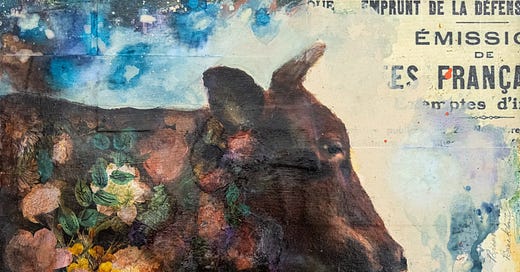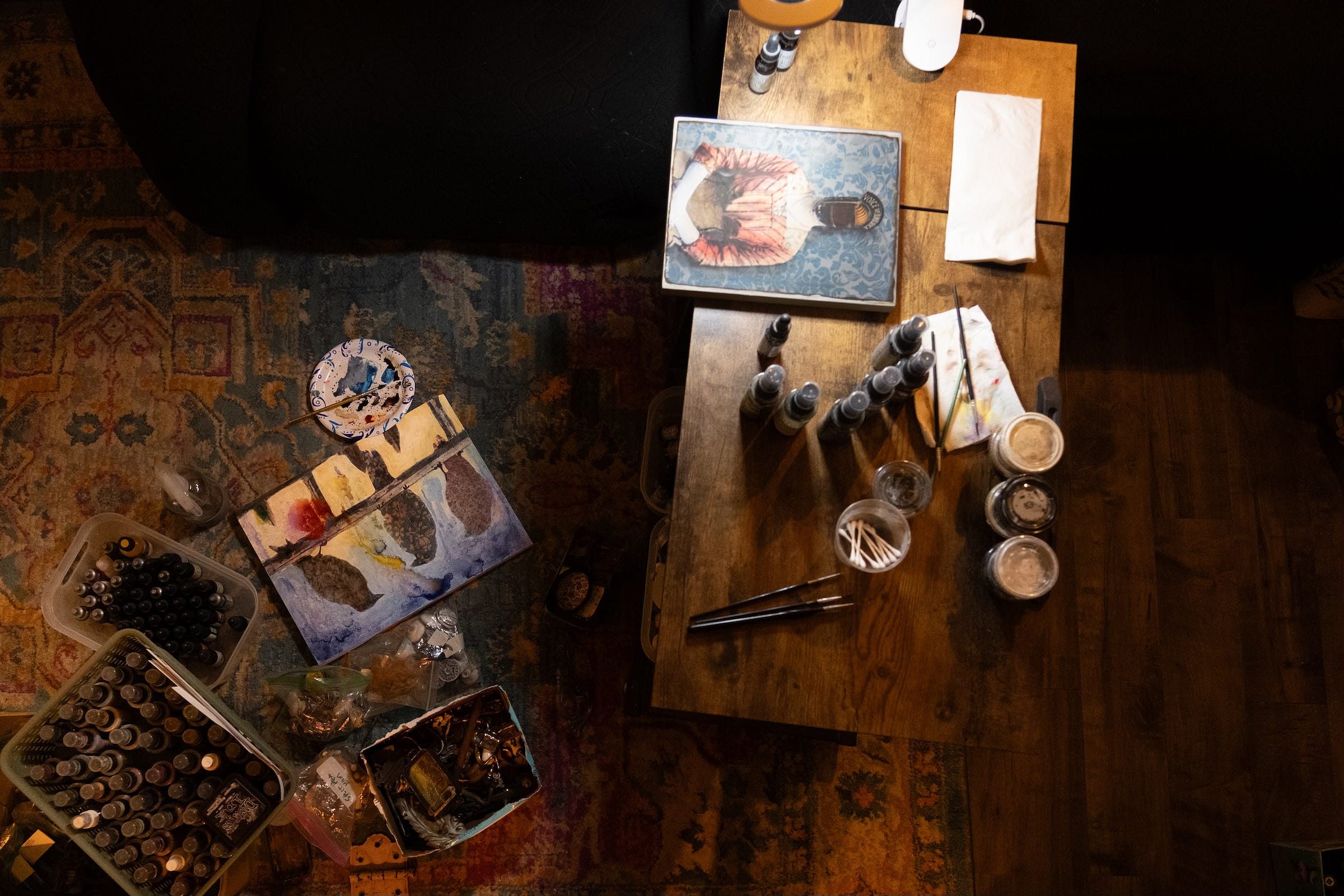You Should Paint: The Art of Betsy Thayer
On display June 7 - July 3, with an opening reception on Saturday, June 7, from 1 pm - 3 pm
You Should Paint: The Art of Betsy Thayer
June 7 - July 3 at Toucan
Opening Reception | Saturday, June 7 | 1 pm - 3 pm
1002 2nd Ave N | 10:30 am - 5 pm Tuesday- Friday | 10:30 am - 4 pm Saturday
Betsy Thayer admits she is still trying to find the words for it. She might be talking about art. She might be talking about life. Her life, of course, but perhaps extrapolated to all life, all of our lives. The nature of being an artist is often associated with such larger contextualization, but the path from thought to thing, from mind to matter, it can be complicated by the inherent obstacle of attempting to express something that is, in its essence, inexpressible.
When words aren’t enough, though, there are pictures. Right? Worth a thousand words, as the saying goes. This is a somewhat ridiculous (and disputed as to its origin) formulation of thought, as these means of expression are manifested in such psychologically polarized ways, one of the linguistic intelligence, the other of the visual-spatial variety (a demarcation delineated by developmental psychologist and Harvard Professor, Howard Gardner, in his groundbreaking book, published in 1983, Frames of Mind). The only point I’m really trying to make being that the words “woman with a microphone for a head” and a picture of a woman with a microphone for a head are two entirely different things, two entirely different modes of communication that we process and interpret in two entirely different ways. And here’s the rub, as the idiom goes: neither of which can truly describe the human condition in its fullness, its maddening incomprehensibility, and for the humans who create that condition, their universal, incessant, will to be alive within it.
The attempt to illuminate this will, however…well, that’s what artists do. And Betsy Thayer is making art.
She calls it a necessity, today, this making of art, but it wasn’t that way for a long time. I mean, sure, she was raised in a creative household in Billings, Montana, with creative parents (to say the least). Her mother was an art teacher (is still an art teacher), maybe the art teacher in Billings, so artmaking was in the ether of her early existence. But Betsy didn’t exactly take to it right away. Her parents were supportive of anything and everything she endeavored to do, however. Still are, she says. “I could call them tomorrow and tell them that I’ve decided to be a rodeo clown, and they would go out and buy me shoes and a nose and be, like, let’s do it! You’re going to be the best rodeo clown ever!”
This parental support creates a kind of platform, a stable base of operations from which to venture out into the world. Because all Betsy Thayer ever really wanted to do was go. Just go. Anywhere. “My mom said that my first words were ‘coat’ and ‘go,’” she says. Her mom would take Betsy with her in a basket all over town to draw the historic homes of Billings for a book she was working on of that very name, Historic Homes of Billings. And so it was that one of her earliest experiences in the world, putting on a coat and going, this defined a life of forward momentum, in such a way as to lead to a lot of things, not just places, but knowledge and skills and competency, no matter the traditional idea of a goal or a destination or an end. “Yeah, I tried so many different things,” she says. “I’m a little bit good at a lot of things.”
You Should Paint: The Art of Betsy Thayer
June 7 - July 3 at Toucan
Opening Reception | Saturday, June 7 | 1 pm - 3 pm
1002 2nd Ave N | 10:30 am - 5 pm Tuesday- Friday | 10:30 am - 4 pm Saturday
This is the artist’s way, though, this winding path to nowhere that becomes the somewhere of personal expression, i.e., telling people about where you’ve been. If you haven’t been anywhere—geographically or psychologically—how are you going to have any stories to tell? Which is why I think there are so many artists who have done something else along the way. Maybe they’re a nutritionist, for instance. Or an architect. Things that might not be art as most people conceive it, but artists need to come from somewhere. And many artists, as Betsy acknowledges, “always have in the back of their mind that they need to have a backup plan.” In Betsy’s case, however, the thing that wasn’t art wasn’t even a backup plan—she never took an art class in college—it was the plan: “I wanted to be a cop.”
Yes, you read that right. And this wasn’t an eight-year-old’s playtime cops-and-robbers kind-of deal. She studied sociology and criminology in college. She uses words like “process server” and “private investigator” and “border patrol.” She was responding to a profound sense of justice, and pursing it in San Diego, California, when—and this is the kind of story where this leads to that, and then the next thing you know, you’re somehow back in Billings—a job opportunity arose, not related to law enforcement, in a family company, with a job description that went something like this: “Can you come do the computers?”
But then the thing about being an artist is that if you already are one, you don’t need to become one. “My mom always told me to paint,” Betsy says. “She was like, you should paint. She would walk by and whisper it in my ear. Literally.” She had been knitting—a lot—to satiate a creative compulsion too profound to deny as anything other than hereditary, when carpal tunnel syndrome crashed the party, and her mother’s words finally breached whatever the barrier between eardrum and cognizance. “The funny thing is, I had bought a bunch of gouache paints from Sally McIntosh’s garage sale,” she says. She had snapped them up because they were such a good price, with no reason or intention to use them, until the day finally arrived and: “I had these paints just sitting around, so I thought, all right, let’s try it.” She was already an artist, after all, she had been since she was born, so what else was she going to do?
Her studio is her living room, the distance from art to life collapsed not to something so prosaic as a calling, but rather to the kind of compulsion that is nothing less than, as she understands it, required for her to exist. She makes art at all hours, especially when she can’t sleep. Because there’s a choice to be made when you’re awake in the middle of the night. Be in that moment, trapped in your head, your intelligence turned against you, or push the door the other way and let your consciousness spill out into the world, onto the paper, the canvas, the board.
Paints and inks and brushes and glue and varnish and spray bottles and jars and patterns and papers, drawing and painting and collage and sadness and hope, a cow, a head on fire, a flying machine, a raccoon with human hands, whatever could be, might be, about us and everything else, marshaled from her place hovering above it, in a gray hoodie and with bare feet, blonde hair up in a knot, delivering, well, let’s call it justice, for our purposes here, onto the contained blankness of time and space she has manifested on her living room floor. This process of making something is unseen in the finished product, of course—in the same way that something like pain is invisible—but this practice necessary for the revelation of art, it might also be essential to the realization of Betsy.
Spirited, motivated, curious, obsessive, she is, in fact, a person who doesn’t so much as live up to the expectations of what an artist is, as to be of these qualities so fundamentally as to not adequately be described by them at all. Art endures only because there are people willing to confront its abyss, to set sail in a tsunami of unease to grapple with the known unknowns and the unknown ones too, but then somehow to find landfall with evidence of the journey endured, an artifact, something we’ve decided to call art. And while nobody really knows what that means, even if a subculture of humans (including me) do try to come up with the words for it, to criticize and pontificate and debate and profess within the limits of its terms, all you need to know, here and now, is that Betsy Thayer is simply one of those people who confronts that abyss, and that in times of unease (or any time at all, really), for anyone who would afford themselves the opportunity to experience it, this art of Betsy Thayer…well, honestly, that we could all be so lucky.
Meet Betsy during the opening reception for her show on Saturday, June 7, from 1 pm - 3 pm. We’ll have snacks, lots of stuff to look at, and, hopefully, as well and as always, some good conversation. We’ll see you then.
You Should Paint: The Art of Betsy Thayer
June 7 - July 3 at Toucan
Opening Reception | Saturday, June 7 | 1 pm - 3 pm
1002 2nd Ave N | 10:30 am - 5 pm Tuesday- Friday | 10:30 am - 4 pm Saturday











